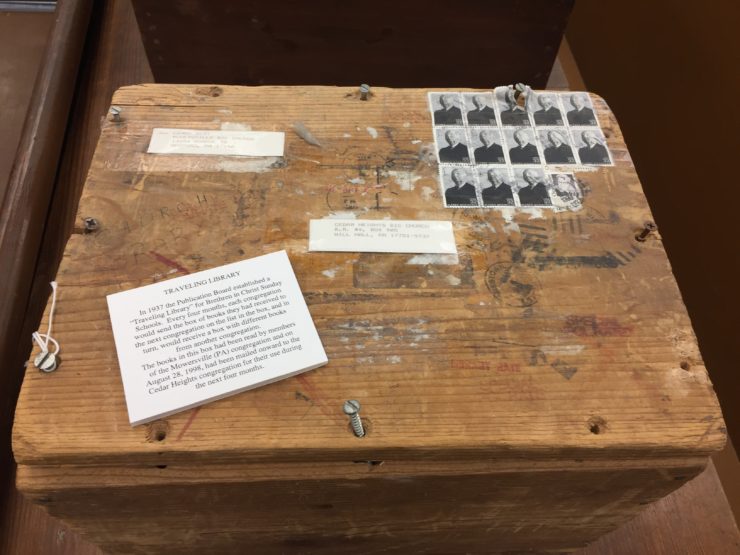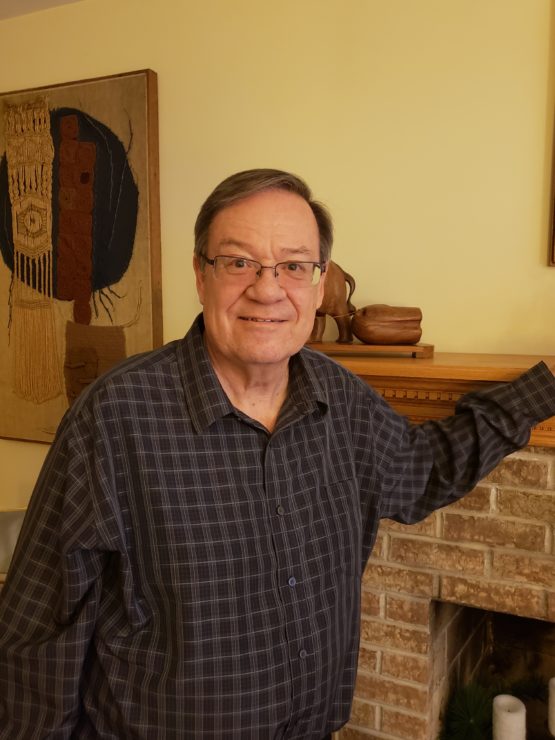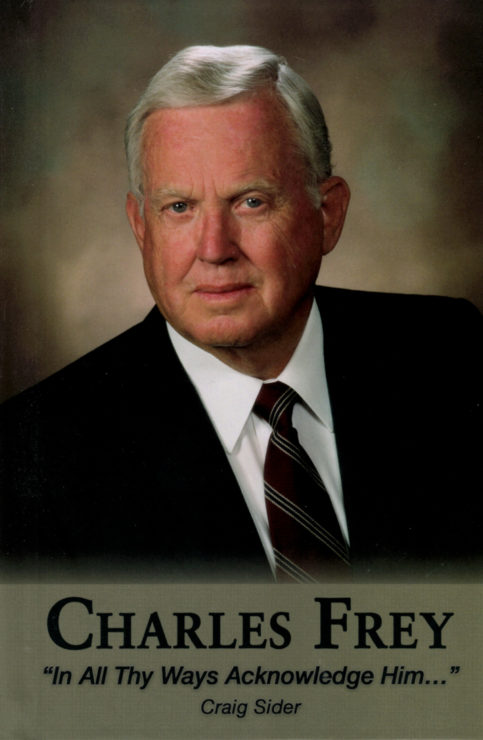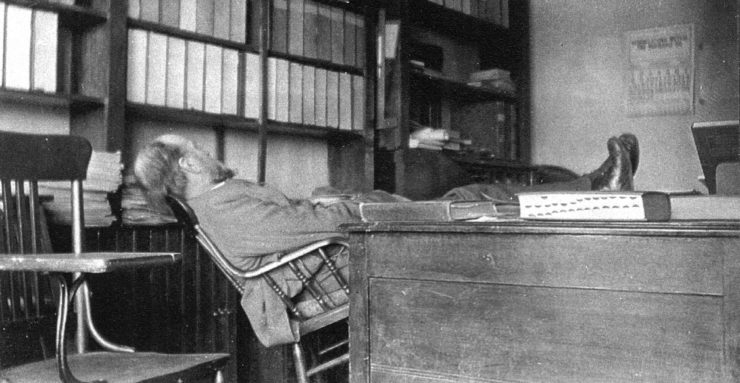The Traveling Library
Periodically in my role as editor for the Historical Society, I visit the Archives to find a photo or missing piece of information or to do research. I don’t often take the time to peruse the exhibits, which perhaps explains why I never noticed the well-worn wooden box on one of the front display tables until recently. I read the caption describing the “Traveling Library,” was immediately intrigued, and wondered why I had never known about such an initiative before.
 The Traveling Library began in 1936 as an initiative of the Publication Board, and initially involved several congregations in southern Ohio. The Publication Board’s report to General Conference in 1937 explains the rationale: “This present age has presented to the world an unlimited supply of books. Thus it is apparent that people desire to read. . . . [M]any Sunday Schools in our brotherhood have expressed the desire to have a library to supply the need of good reading literature. The cost of installing a permanent library was too great for them to consider. . . . This appeal led our Publication Board to institute a system whereby our people may read good Christian literature without a great deal of expense.”
The Traveling Library began in 1936 as an initiative of the Publication Board, and initially involved several congregations in southern Ohio. The Publication Board’s report to General Conference in 1937 explains the rationale: “This present age has presented to the world an unlimited supply of books. Thus it is apparent that people desire to read. . . . [M]any Sunday Schools in our brotherhood have expressed the desire to have a library to supply the need of good reading literature. The cost of installing a permanent library was too great for them to consider. . . . This appeal led our Publication Board to institute a system whereby our people may read good Christian literature without a great deal of expense.”
Congregations could pay $20.00 to enter the traveling library system as lifetime members and would receive a box of books every four months, sometimes hand-delivered from one congregation to another. After a trial period of about two years, the Publication Board offered the traveling library to a wider audience. By 1942, when the U. S. Postal Service instituted a “book rate,” the traveling library could be sent to any congregation in the U. S. (and there is some evidence that it may have extended into Canada as well). According to the caption on the box in the Archives, “each congregation would send the box of books they had received to the next congregation on the list in the box, and in turn, would receive a box with different books from another congregation.”
In its 1943 report to General Conference, the Publication board noted that “the largest number of readers are from the children and young people’s groups, therefore we have greatly increased the number of books appealing to these groups.” The report also said that the office of central librarian moved from Nappanee, Indiana to Elizabethtown, Pennsylvania, where a Christian Light Bookstore was located. The 1946 report noted that the “scarcity of books through the latter years of the war made the building of new units almost prohibitive.”
We know that the Traveling Library continued operation until at least 1998 because the box in the Archives is postmarked August 28, 1998. That box had been shipped from the Mowersville (PA) congregation to the Cedar Heights (PA) congregation.
I was curious about whether others remembered the Traveling Library and so posted the above photo on the Historical Society’s Facebook page. The response surprised me—and helped jog my own memory of a traveling library display at the Grantham Church many years ago that I had never connected to a denominational initiative.
Many of those who commented on Facebook—almost all women—told of their memories of the traveling library. Many congregations were named: Cedar Springs (later Cedar Heights), Grantham, Harrisburg, Locust Grove, Mastersonville, Mechanicsburg, Palmyra, Refton, all in Pennsylvania; Nappanee, Indiana; Dallas Center, Iowa; Sippo Valley, Ohio; Zion, Kansas; Clarence Center, New York; and Springvale, Ontario. Respondents described how they eagerly looked forward to a new box of books, many of them hoping for another book by Grace Livingstone Hill (a popular Christian romance novelist). One person remembered working in the Christian Light Bookstore in Elizabethtown between missions assignments where she helped to pack boxes. One of only two men who responded noted that he was pastor of the Cedar Heights congregation in 1998 and thus may have gone to the Post Office to pick up the very same box that is currently in the Archives.
The story of the Traveling Library box is an interesting confluence of the old and the new, and says something about how current technologies can help us tell the stories of the past. I made an interesting discovery in the Archives, a repository of “old” things, and then shared my discovery on social media, a newer technology. This in turn generated stories that offer some rich context to the artifacts and documents that quietly wait in the Archives to be discovered. Who knows what other interesting discoveries are waiting to be made, and what new stories they will elicit to enrich our understanding and knowledge of the past?
Among the 22 books in this Traveling Library box were the following titles:
The Prodigal Wolf
Breakfast with Jesus
Mystery at Camp Ichthus
The Dog Who Would Not Smile
Song of the Silent Harp
Wings of the Morning
Return to the Hiding Place
How to Eat Humble Pie and Not Get Indigestion
Making Peace with Your Past
Just As I Am
Thanks to Archivist Glen Pierce for researching Publication Board reports to General Conference. Join us on Facebook.
 We are pleased to announce the appointment of Ken Hoke as the new Executive Director for the Brethren in Christ Historical Society. Ken has been a member of the Historical Society board for over 10 years and has broad experience within the Brethren in Christ Church.
We are pleased to announce the appointment of Ken Hoke as the new Executive Director for the Brethren in Christ Historical Society. Ken has been a member of the Historical Society board for over 10 years and has broad experience within the Brethren in Christ Church.

 The Traveling Library began in 1936 as an initiative of the Publication Board, and initially involved several congregations in southern Ohio. The Publication Board’s report to General Conference in 1937 explains the rationale: “This present age has presented to the world an unlimited supply of books. Thus it is apparent that people desire to read. . . . [M]any Sunday Schools in our brotherhood have expressed the desire to have a library to supply the need of good reading literature. The cost of installing a permanent library was too great for them to consider. . . . This appeal led our Publication Board to institute a system whereby our people may read good Christian literature without a great deal of expense.”
The Traveling Library began in 1936 as an initiative of the Publication Board, and initially involved several congregations in southern Ohio. The Publication Board’s report to General Conference in 1937 explains the rationale: “This present age has presented to the world an unlimited supply of books. Thus it is apparent that people desire to read. . . . [M]any Sunday Schools in our brotherhood have expressed the desire to have a library to supply the need of good reading literature. The cost of installing a permanent library was too great for them to consider. . . . This appeal led our Publication Board to institute a system whereby our people may read good Christian literature without a great deal of expense.”